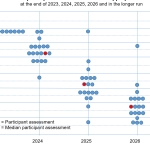Year-end giving strategies for 2023

As we approach the end of 2023, it’s time to consider how strategic giving can support the causes you care about and provide potential tax benefits. The landscape of charitable giving has evolved, and understanding these changes is key to making the most of your contributions. Here are some effective giving strategies to consider for this year.
Adjusted Gross Income (AGI) considerations
Your AGI plays a crucial role in determining the deductibility of charitable contributions, which must be claimed as itemized deductions on Schedule A of IRS Form 1040. For the 2023 tax year, the limit on charitable cash contributions is set at 60% of the taxpayer’s adjusted gross income (AGI). The limit is 30% on donating appreciated non-cash assets held for more than one year. If you’re considering making substantial donations, it’s important to be aware of how your AGI might limit the deductible amount. Planning your contributions around your AGI can optimize your tax benefits while supporting your favorite charities.
Understanding the bunching strategy
With the standard deduction amounts adjusted annually, it’s essential to calculate whether itemizing deductions is more beneficial than taking the standard deduction. The “bunching” strategy involves consolidating charitable donations into one tax year to surpass the standard deduction threshold, thereby maximizing itemized deductions. For 2023, the standard deduction is $27,700 for married couples filing jointly ($13,850 for single filers). That amount raises to $29,200 ($14,600 for single filers) for 2024, so it might be wise to itemize this year so you can claim the increased standard deduction next year.
Donating appreciated assets
Donating appreciated assets like stocks can be a win-win. For assets held longer than one year, you can avoid capital gains tax on the appreciation and claim a tax deduction for the full market value of the asset at the time of donation. This strategy is particularly effective for securities that have significantly increased in value since purchase.
However, if you hold stocks where a loss has been incurred, a more tax-efficient approach may to sell the stocks, realize the capital loss for tax purposes, and then donate the cash proceeds.
The power of Qualified Charitable Distributions (QCDs)
For those over the age of 70 ½, QCDs offer a tax-efficient way to donate. Money given directly from an IRA to a qualified charity counts toward your required minimum distribution (RMD) and isn’t included in your taxable income. This can be an effective way to reduce your tax burden while fulfilling your philanthropic goals.
For 2023, IRA owners can exclude gross income up to $100,000 with QCDs, and qualifying married couples can exclude up to $200,000. This option is available regardless of whether an eligible IRA owner itemizes deductions.
Leveraging annual exclusion gifts
The annual exclusion gift is an often-overlooked strategy for reducing your taxable estate. You can give a certain amount to as many people as you like each year without incurring gift tax or affecting your lifetime gift and estate tax exemption. This method is great for supporting your loved ones while managing your taxable estate.
Individually, you can give up to $17,000 to as many individuals as you choose (or $34,000 with your spouse if you’re married). Not only are these transfers tax-free, but they can also potentially save taxes that may otherwise be paid by your estate upon death.
If you have loved ones with significant tuition or medical expenses, you can pay those expenses directly without creating a taxable gift. You can also contribute to a 529 education plan with your annual exclusion if you have children or grandchildren who can benefit.
The importance of planning for future changes
Tax laws and limits are subject to change, and what works this year might not be as effective next year. Keeping abreast of these changes and planning accordingly can ensure that your charitable giving remains both impactful and tax-efficient.
Every individual’s financial situation is unique. An expert advisor can provide personalized advice tailored to your specific circumstances. For more information, please contact our office to speak with one of our expert advisors.



